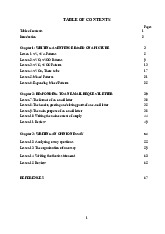


Preview text:
CRIME
The causes of crime and re-offending: -
The causes of crime are complex. -
Poverty, parental neglect, low self-esteem, alcohol and drug abuse can be
connected to why people break the law. -
Some are at greater risk of becoming offenders because of the
circumstances into which they are born. -
A criminal record makes finding a job more difficult => Many prisoners
re-offend when they are released. Nature -
Younger people tend to have higher rates of crime. -
The brain does not fully develop until the age of 25. -
This means teenagers can be more impulsive and can act without
considering the consequences, and that this can make them more likely to
be involved in criminal behaviour. -
People who commit crime are more likely to get angry or have less
understanding of another person's feelings. Nurture -
People are more likely to commit crime because of the world around them
– i.e. they are living in poverty, drink alcohol or experience peer pressure. -
Deprived areas tend to have higher crime rates, and this suggests that poverty can lead to crime. -
Alcohol is a big contributor to crime. When drunk, people may think less
about the consequences of their behaviour. They are also less able to control their emotions. -
Peer pressure is a cause of crime among younger people. This is when
someone is forced or persuaded to do something they would not normally do.
The consequences of crime Individuals -
Crime has a range of effects on victims and their families. -
People affected may be hurt emotionally, physically and/or financially. -
The effects can be worse if the crime involves violence. Communities -
Communities which experience higher levels of crime are also adversely affected. -
Apart from people being frightened inside or outside their own home,
property prices are affected and homeowners can find it more difficult to sell their property. -
New businesses may avoid the area and existing businesses may close
down due to crime such as repeated theft, vandalism or having too few customers as a result.
Solutions to crime and re-offending -
Individualists believe that if punishments were stronger and the police and
courts had more powers, there would be less crime. -
Social conditions which create the catalyst for crime need to be addressed. -
This could be through better housing, improved employment
opportunities and a more equal society to diminish crime. -
If people are in work and are content with life, they will be less likely to break the law. -
Prisons should provide education or vocational training. -
Rehabilitation programmes prepare prisoners for release into society. -
Community service is another way to reform offenders. -
It makes offenders useful in their local communities. -
They might be required to talk to school groups or clean public areas. -
Offenders also need help when looking for accommodation and work. MONEY
Opinions about a maximum wage
- it might be considered beneficial to allow people to be paid extremely high salaries
- If companies offer excellent pay packages, they can attract the most
talented people in their fields to work for them
- For example, technology companies like Google are able to employ the
best programmers because of the huge sums that they are willing to pay
- well-paid employees are likely to be highly motivated to work hard and
therefore drive their businesses successfully
- this should result in a thriving economy and increased tax revenues,
which means that paying high salaries benefits everyone.
- There should be a maximum wage
- By introducing a limit on earnings, the pay-gap between bosses and employees can be reduced
- the difference between normal and top salaries is huge, and this can
demotivate workers who feel that the situation is unfair
- With lower executive salaries, it might become feasible to introduce
higher minimum wages, and everybody would be better off
- greater equality could be that poverty and crime rates fall because the
general population will experience an improved standard of living.




